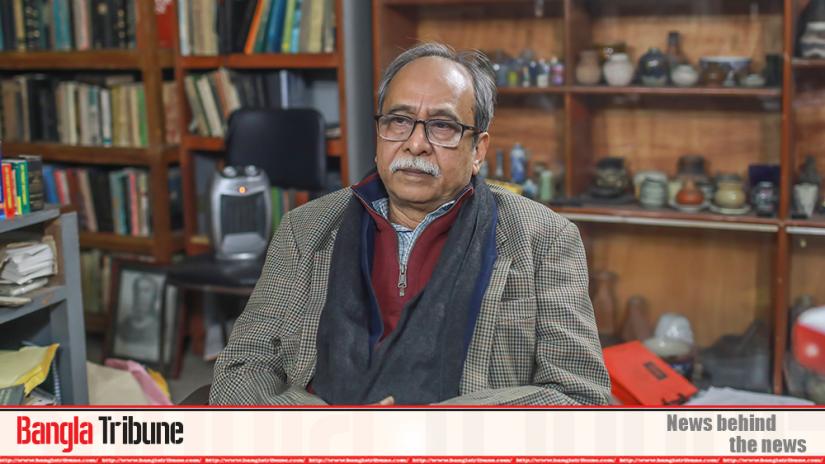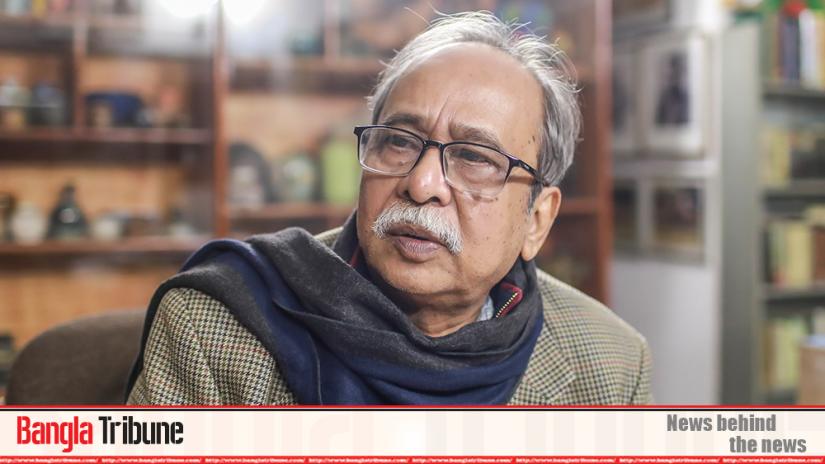 Historian Muntasir Mamun who has retired from Dhaka University wrote several books on Bangabandhu and has carried out researches. He received his Masters in History from Dhaka University in 1972 and a PhD from the same department in 1983.
Historian Muntasir Mamun who has retired from Dhaka University wrote several books on Bangabandhu and has carried out researches. He received his Masters in History from Dhaka University in 1972 and a PhD from the same department in 1983.
During his student life, he worked as a journalist for weekly Bichitra and in 1974, joined the Dhaka University as a lecturer.
He gave an exclusive interview to Bangla Tribune on occasion of Bangabandhu’s centenary.
BT: You served as Bangabandhu chair at DU; previously, you were director of an institute of National University. What sort of work was done on Bangabandhu?
MM: At the National University, Muktijuddho, Bangabandhu and Bangladesh Institute was established which is the first of its kind and came into being in 1999. This offered Mphil and PhD but after Borhan Uddin Khan Jahangir left, this almost closed down. But since the Mphil of the first batch was done, we began research on Bangabandhu.
At that time, a book “Bangabandhu and Bangladesh” was published along with some other research-based work but this stopped during Awami League period.
The Bangabandhu chair at DU is formed by Zebunnessa Trust. When I was chair, some research work was done.
BT: How original are the writings that are now being done on Bangabandhu?
MM: The research of Bangabandhu has increased after this government came to power. However, to carry out research, solid materials will be needed. Old materials are being recycled constantly. Based on the secret report revealed by Sheikh Hasina we are getting new information. I wrote two books based on the information. One is called Chhatra Rajniti theke Jatiyo Rajniti, covering student politics to national politics and the other is called Jail theke Jail e meaning from jail to jail.
BT: Is there any base in the criticism aimed at Bangabandhu’s role in movement and social activism?
MM: Many feel that Bangabandhu has not made any contribution to the language movement but I have seen intelligence reports and know that he was linked to the language movement since 1949. He also worked from jail in 1952. Therefore, these criticism do not have any base at all.
BT: As part of the centenary, Bangla Academy will publish 100 books and there will be others too….will these have anything new?
Form one angle this is laudable but how long they will last is the question. Books will end up giving the same information. Many will be copy and paste.
BT: How would you compare modern-day politicians with Bangabandhu?
MM: He is incomparable. AL is running on the ideals he established. He dreamt, made people believe in that dream and then delivered it.
BT: What else can be done about Bangabandhu?
MM: There is much to be done, but it has to be done from the perspective of a researcher.  BT: Any effort to ensure that Bangabandhu’s legacy is not distorted?
BT: Any effort to ensure that Bangabandhu’s legacy is not distorted?
MM: There will always be efforts to distort history but it’s never possible.
BT: How do you regard the narrative that Bangabandhu was a successful politician but not so much as the head of the government?
MM: This is not true at all. The effort to ensure proper water sharing, demarcation of sea borders and others were done during his tenure. The laws of all government corporations existing today were done during the time of Bangabandhu.
After the war the country was penniless and from zero he took the country to the position which is almost impossible.
After independence, Bangabandhu faced national and international opposition. In the country, one section of AL opposed him along with far leftists. The GDP, food intake ration, nutrition during Bangabandhu’s time were better than that of the period under Ziaur Rahman.
BT: What else can we do with Bangabandhu?
MM: Once the secret documents come out, we can cross-check many documents and do something good. But the problem is the AL office does not have AL documents.
In my opinion, on the birth centenary, a 100-page official biography both in English and Bengali need to be printed.
I have always advocated the inclusion of history between 1947-71 and 1972-75 in the academic curriculum but failed to inspire policymakers.
There is a law in many countries that to be a citizen one has to know the law and history; to give a clear idea about liberation war, this has to be included as text at several layers.
I am surprised that many high officials of the ministry of education dismiss the need for such a subject.
 National
National
41261 hour(s) 3 minute(s) ago ;
Evening 11:57 ; Tuesday ; Jul 01, 2025
History should be taught at all levels: Muntasir Mamun
Send
Emran Hossain Shaikh
Published : 06:00, Jan 26, 2020 | Updated : 06:00, Jan 26, 2020
Published : 06:00, Jan 26, 2020 | Updated : 06:00, Jan 26, 2020
0 ...0 ...
/tf/
Topics: Top StoriesExclusive
- KOICA donates medical supplies to BSMMU
- 5 more flights to take back British nationals to London
- Covid19: Rajarbagh, Mohammadpur worst affected
- Momen joins UN solidarity song over COVID-19 combat
- Covid-19: OIC to hold special meeting
- WFP begins food distribution in Cox’s Bazar
- WFP begins food distribution in Cox’s Bazar
- 290 return home to Australia
- Third charter flight for US citizens to return home
- Dhaka proposes to postpone D8 Summit
Unauthorized use of news, image, information, etc published by Bangla Tribune is punishable by copyright law. Appropriate legal steps will be taken by the management against any person or body that infringes those laws.
Bangla Tribune is one of the most revered online newspapers in Bangladesh, due to its reputation of neutral coverage and incisive analysis.
F R Tower, 8/C Panthapath, Shukrabad, Dhaka-1207 | Phone: 58151324; 58151326, Fax: 58151329 | Mob: 01730794527, 01730794528


